#INTERVIEW: Gantz’s Hiroya Oku On Creating The Outstanding GIGANT
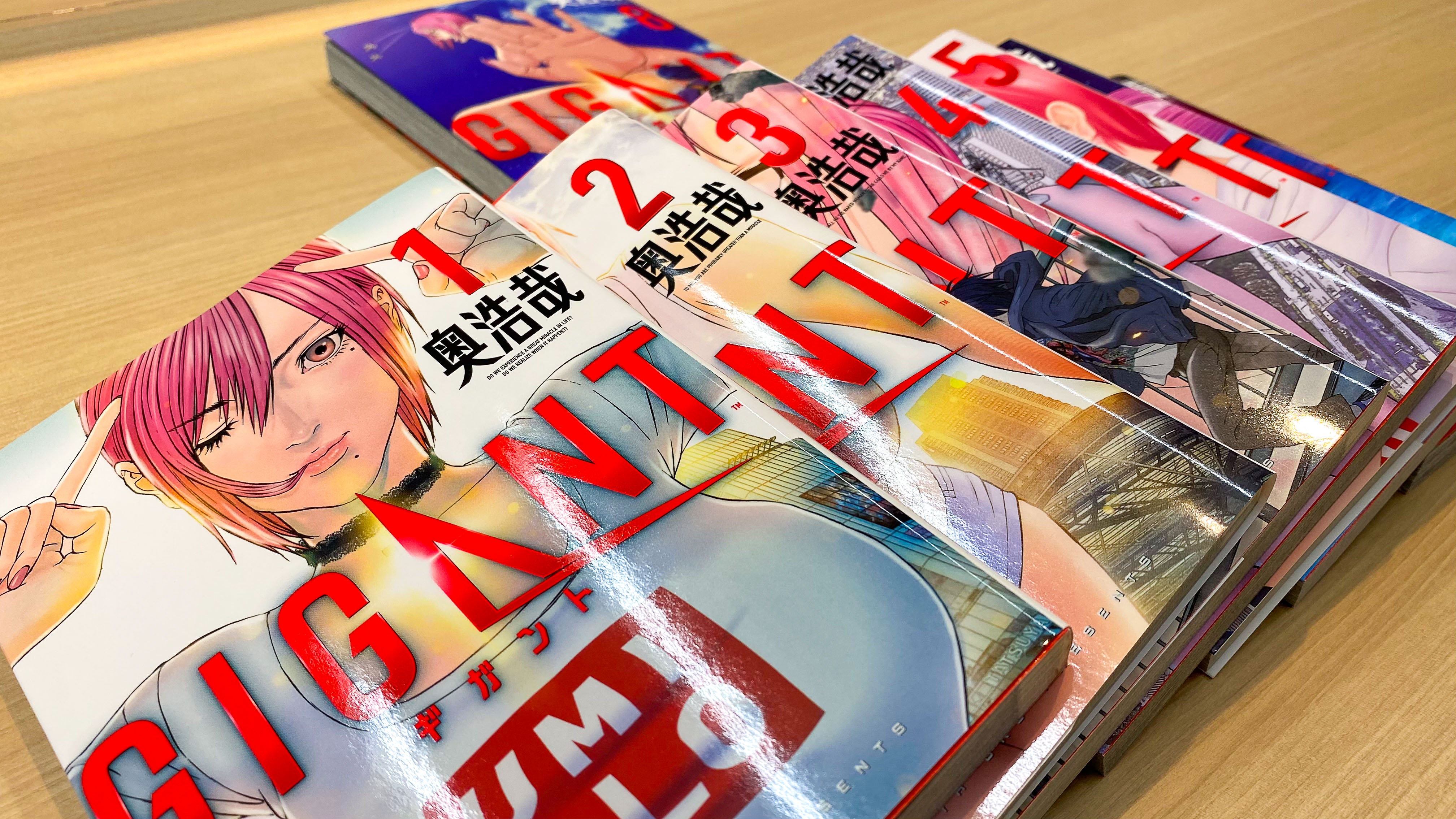
“#INTERVIEW: Gantz’s Hiroya Oku On Creating The Outstanding GIGANT”

Photo credit: Daryl Harding
A few months back, I sat down with Hiroya Oku, one of manga’s greatest creators, along with Kaho Shibuya, a friend of the noted manga author who also acted as translator and support. Most well known for creating the popular sci-fi manga series GANTZ and Inuyashiki, Oku is currently penning the manga GIGANT, a story about a Japanese adult film star who gains the ability to become a giant, which started serialization in Big Comic Superior in 2017.
In this two-part interview series, we dive deep into his process of creating manga, where GIGANT came from, the future of the series, and his thoughts on the Hollywood version of GANTZ, and much more. The following is part one of the interview, focusing on the production process of GIGANT and Oku-sensei's love of film and TV. Alongside Oku-sensei was his editor, who had some input in the interview.
Note: the interview has been translated from Japanese into English and edited down for clarity and flow.
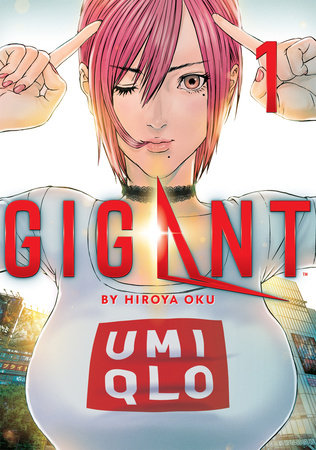
Image via Seven Seas Entertainment
Daryl Harding: Before we start the interview, how are you today?
Hiroya Oku: I’ve been well, but I’ve been in a state of shock since I’ve just heard the news that the Kentaro Miura-sensei (Berserk creator) has passed away.
[Note: The news of Kentaro Miura’s passing happened only an hour before the interview took place]
Harding: I can imagine … It's really unfortunate.
Oku: Yeah, he was just a year older than me…
Harding: You’ve been known to watch a lot of TV and films. Have you watched anything interesting recently?
Oku: I found Invincible incredibly wonderful and enjoyable. Their grotesque expressions were pretty effective, and the story was totally unpredictable. I really enjoyed the series.
The powerful action scenes, especially in the final episode, got me really excited, and though the episode did feel like the finale of Season 1. I’m already looking forward to more. That episode was definitely a fun one to watch.
Harding: Are there any upcoming films that you are excited to see in a movie theatre?
Oku: The two films I can’t wait to see are Godzilla vs. Kong and Mr. Nobody.
Harding: What have been your favorite films in the past?
Oku: My absolute favorite films are Die Hard and Back to the Future, that’s why I always bring them up.
Harding: Any Japanese films?
Oku: Hmm…not so much a movie, but the TV show called Hissatsu Shigotonin was the inspiration behind GANTZ. It was a period drama about assassins.
Harding: Now getting into GIGANT. First off, let me say that it was so good that I read all of the available English volumes in one night! Only 4 volumes were available so I was left in suspense.
Oku: (laugh) Oh, thank you! I’m glad you liked it!
Harding: I saw a lot of buildings destroyed at the end of the fourth volume. Why did you choose Tokyo as the setting of the series and the location to destroy?
Oku: As Japan’s most populated and known city, the setting seems to naturally bring in more of an audience. Though some anime are set in other prefectures and become ambassadors for the area, a lot of seinen manga and Japanese TV shows are based in Tokyo. It’s also easier if my assistants and I can go out and get reference materials in the city as I trace photos for backgrounds.
Manga always sells best in Tokyo, meaning there are more people in the city to buy manga than in other areas. So it would make sense that readers would identify with Tokyo the most when it gets destroyed.
Harding: I was personally shocked to see Roppongi getting torn down. Like, "I've been there…oh… it's all gone!"
Oku: It's funny to see some of those kinds of comments on social media, "That's my company! Go destroy it!"
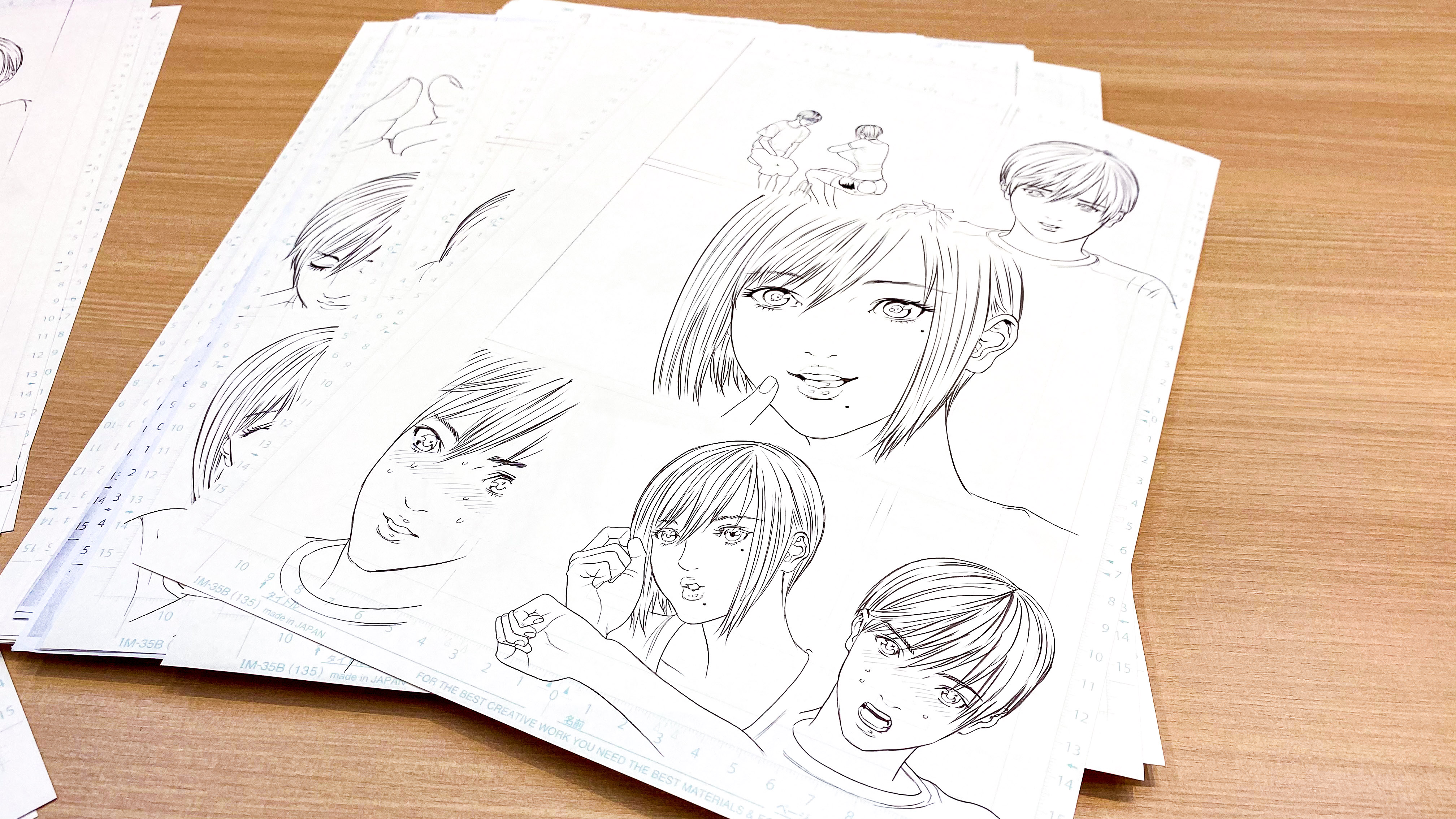
Photo credit: Daryl Harding
The finished manuscript for GIGANT before the backgrounds are applied on a computer
Harding: What inspired you to write GIGANT in the first place?
Oku: It all started when I watched the DreamWorks Animation film Monster vs. Aliens. In that film, a girl called Ginormica grows pretty big. Watching those scenes made me think, “With methods of photo-tracing and use of CGI, what if I wrote a manga like this?”
My motto as a manga creator is to "create something no one has seen yet." That is the ethos of my work that I want to take with me ‘till the end of my career. Even though the inspiration for the series is from Monster vs. Aliens, I wanted to cook it into a completely different dish that nobody has seen before. I always think about how unique my manga can be, so unexpected things in my work just kind of happen naturally.
Kaho Shibuya: Won't that cause you to write similar stories?
Oku: I'd try to avoid cliché themes and not use too many points that have been seen often before. I don't like really using familiar narratives or giving my characters stereotypical lines.
Harding: Each of your series is completely different from one another, with Inuyashiki being completely non-sexual, and GIGANT having a gigantic naked pornstar. How do you keep coming up with these contrasting themes?
Oku: All those ideas have been flowing within me for a long time, accumulating and becoming series one by one. GANTZ came to me in high school, and after many years when my skills were good enough, I finally started writing the manga series. This was the same with other titles; they just got their turn in the spotlight.
In the case of Inuyakishi having little sex appeal, which is rather frequent in my work with big-breasted women, I figured such an atmosphere would fit the story. However, it's not like I was holding back. That was simply how it was for Inuyashiki.
GIGANT though, with the story being about a girl whose body grows enormous, nudity is naturally unavoidable, especially for her when her clothes will be torn in the process. I can tell this series will likely not get an anime adaptation. (laugh) But it's okay because I truly wanted to create something unseen before.
Oku's Editor: From an editor's point of view, nowadays we think "manga needs to have anime adaptation to sell well." This is especially true for shonen series. But Oku-sensei’s vision keeps his creative mind going. He's not aiming for anime or live-action development. For me personally, that gives me pride as an editor. It's always "manga first" for him, trying to find effective expressions that only manga is capable of. I really appreciate his approach.
Oku: When I started GIGANT, I told them specifically that "there is no way this manga will have anime adaptation" and they agreed. The publisher really gives me free rein to write what I want.
Shibuya: It is really cool that the focus is not on the commercial side but more about respecting the art. Good to hear that the manga creator's imagination can go wild.
Oku's Editor: I don't want to put a limit on a writer's imagination and keep them within a box. As an editor, I'd like to see them expand their imagination. This may sound a little naive, but that's how I feel sitting in the backseat.
Shibuya: I assume the reason why Oku-sensei can write so freely now is that he's earned it from the success of GANTZ.
Oku: That’s exactly it. The fact that the series still sells well as ebooks enable me to be adventurous with my new works. My life is greatly supported by the popularity of GANTZ.
Shibuya: In previous interviews, it’s often mentioned that one of your first works, 01<ZERO ONE> was a commercial failure and financial struggle. With almost all your other works becoming successful in one way or another, how difficult was 01 for you?
Oku: As my first manga with a CGI background, I spent three years and a lot of money prepping computers and the workflow for the series. 01 was a very ambitious work that I really enjoyed writing, yet the series didn't gain popularity and the manga didn't sell at all. I thought I was going to go broke if I continued drawing the story. Well actually at that point, I was already close to losing all my money.
The work was emotionally fun but financially tough. I needed to let go and start working on another manga, so I asked my editor to end the series.
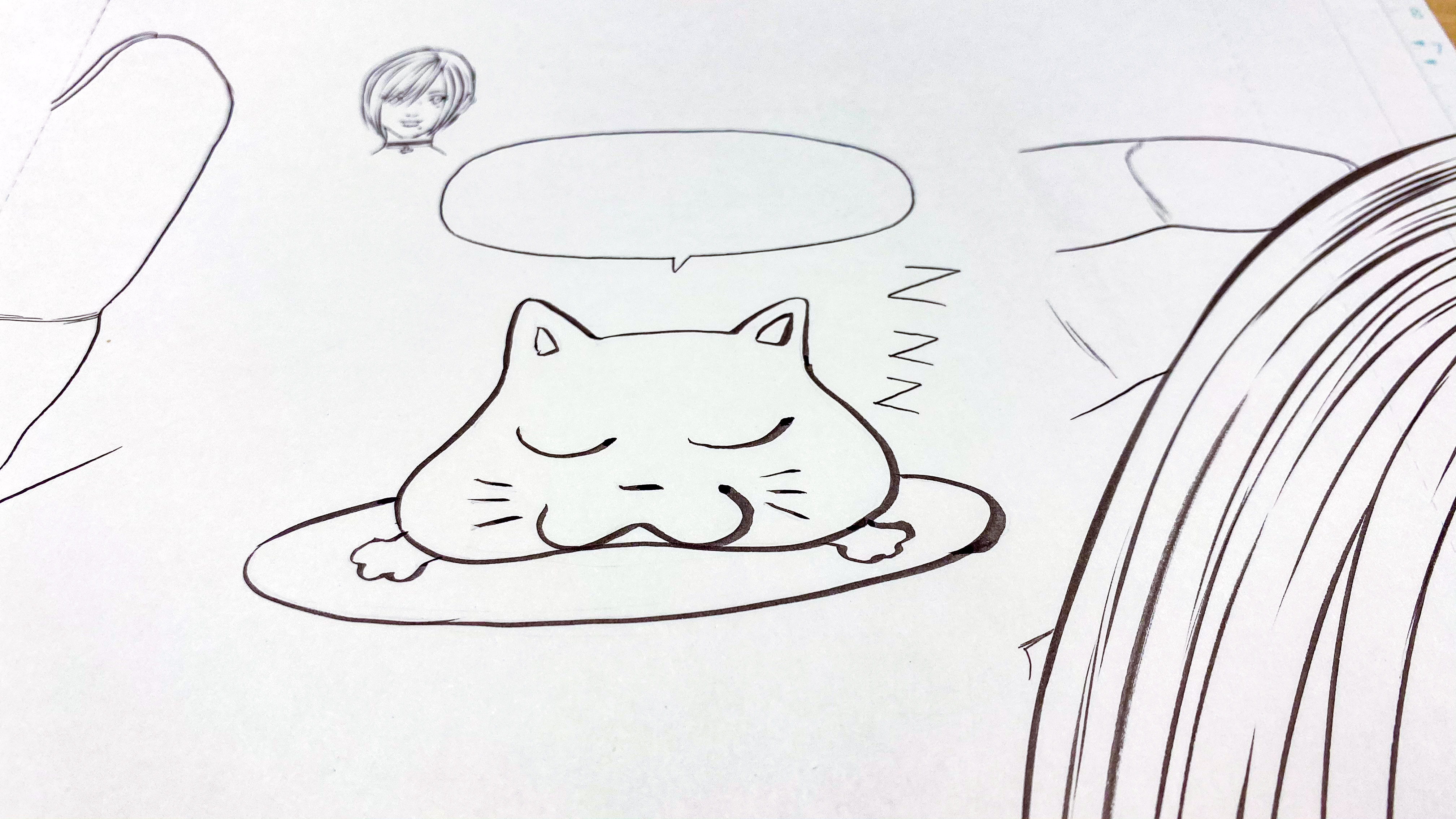
Photo credit: Daryl Harding
Chat messages in GIGANT before the CGI phone was inserted into the panel
Harding: Talking about technology in your manga, what software or tools do you use?
Oku: We mainly use a Japanese 3DCG software called ‘Shade 3D.’ Originally, we used the program on a Mac, but now all of us, including my assistants, work on Windows. Shade is an affordable piece of software that lets me create automations. Kind of like in Photoshop, there is a feature where you press a button and it automatically does what I have done in the past…
For example, I ask my assistant to remove lines in a scenery photo and make it clean. Once they've done the action, the software learns the process and can easily remove the lines next time. We share the automations as well. Sometimes, we’ll craft the final page by hand if it's needed.
We only use CGI for the backgrounds and some props like guns. As far as people go, all the characters, including those in the background, are drawn by me alone, not even my assistants help with them.
There was a page in GANTZ’s first volume that showed the process of the CGI backgrounds and my drawings, and I just let my assistants handle that section. But they didn’t just put in a plain 3D background, they also added 3D models of characters to the image even though we don’t use 3D models for characters at all. Because of this, some people have misunderstood my process and think we use 3D models, but if I tried using them, my drafts wouldn’t look good at all.
Harding: Because CGI has advanced a lot since then, have you thought about moving towards all-3D work?
Oku: Not even a little bit. When I tried going full-CGI in 01 single-handedly, I didn't feel like it was for me. I wasn't fond of the art style. Those all-3D scenes were only for the game part of the series, so it was okay, but I wouldn't have liked to see those kinds of shots in other scenes.
Shibuya: It would have been interesting to see the 01 covers drawn by hand rather than be full-3D.
Oku: That was the publisher's idea, not mine. Though, I don’t know if changing the cover would have affected manga sales. I think a manga selling well is partly due to luck.
As a matter of fact, when I was writing 01 in Young Jump, Shonen Jump's Man☆Gatarou-sensei (creator of Hell Koshien) wanted to meet me in person because he was such a big fan of the series, saying "if this was in Shonen Jump, it would have been incredibly popular!"
Harding: In Inuyashiki, you used a drone and helicopter to take images of the city view from above for reference shots. Have you done anything new for GIGANT?
Oku: We’ve used a helicopter once for GIGANT as well. Most of the aerial shots used in the manga are from that ride, especially in the panels that feature Roppongi and Kachidoki Bridge.
Harding: Oh wow! How hard is it to have a permit like that in Tokyo?
Oku: It's actually quite easy. You just need to make a reservation at the Tokyo Heliport. I went with my cameraman and editor-san, all three of us were taking photos from various angles around Tokyo.
Harding: Sounds quite expensive…
Oku: For Inuyashiki, it cost me around 1 million yen (around US$9,000). This time with GIGANT, Shogakukan generously paid for the helicopter ride.
Nowadays we cannot use a drone freely in Tokyo because regulations have become strict. But back in the Inuyashiki days, not enough people knew about drones or owned them, so there weren't any rules. Though, I didn't know anything about drones either at that time. In fact, I’d asked my editor at the time if it was possible to put a camera on an RC plane and shoot from a high level and that’s when I was introduced to a drone service, which was around 50,000 yen (around US$450) a day. Drones are much nicer on your wallet.
Harding: Is it scary being that high up?
Oku: I've been on a helicopter quite a few times and not just for manga reference. I've taken a sightseeing flight in New York City as well.
Harding: How different is the writing process of GIGANT compared to your earlier series like GANTZ?
Oku: For the mecha sections, we regularly reused data from GANTZ, that way we can save time and money, especially the latter since it costs a lot to create mechanical images in CGI.
Harding: How has COVID changed your creating process or the story itself over the last two years?
Oku: It hasn’t really. I only have three assistants, and they come to my workplace. I won't bring the coronavirus into the storyline of GIGANT either because it might complicate the entire story.
Shibuya: When Inuyashiki started, you were already planning to end at the tenth volume with a clear vision for the ending too. How about GIGANT?
Oku: It’s the same. I've known how long the series will go for and how it ends since the beginning. That’s why the story won't be affected by the current news. Just like Inuyashiki, the tenth volume will be the final one for GIGANT.
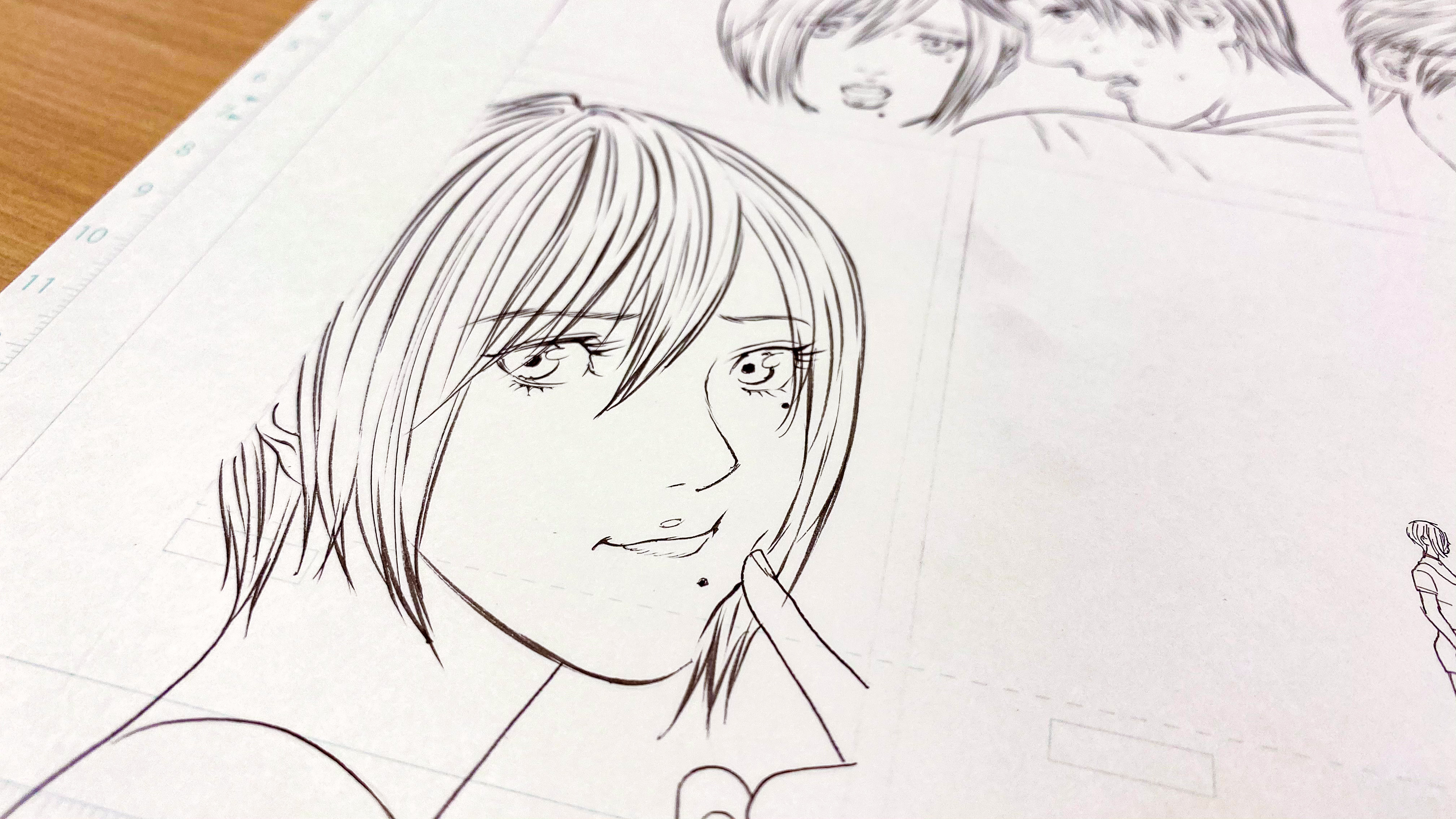
Photo credit: Daryl Harding
Shibuya: You seem to try and create a realistic world for your works, such as creating real Twitter accounts for Papico and having real cat food in the entryway of her apartment. Even in the JAV (Japanese Adult Video) panels, there are baskets of lotion and drinks, adding to the air of realism. How are you able to grasp this so easily?
Oku: I just go with the flow really. I would like my readers to experience the kind of illusion that my characters live in a real-world with realistic human reactions and that depict realistic everyday life – a world one that we could be in. This is one of the goals that I’m constantly trying to achieve. One way I try to do this is by adding depth to the background art to hopefully make you feel immersed while reading.
Shibuya: Typically when we see JAV depicted, it often shows the actors being together or climax shots. Instead, you showed them getting prepared by drinking water.
Oku: That’s right. I was given this opportunity to be on an actual JAV shoot, so I wanted to deliver the realistic atmosphere that I felt. Since I was able to have this kind of experience, I felt I could understand what kind of things would give more behind-the-scenes feelings and things that I found interesting to spot.
Harding: Is it rare for a manga creator to want to do the leg work for gathering materials?
Oku's Editor: For mature series, which unlike most shonen series are not fantasy-based, a majority of creators like to physically experience what they're writing about. Oku-sensei in fact works more out of his imagination than out of those experiences. I feel like he's got a good understanding of things and is able to piece things together well. Some manga, like ones specializing in food and cooking, have the artists do incredibly thorough research.
Oku: I do only a bit compared to them. My challenge is whether I can fool readers with as little fieldwork as possible (laugh). I mean, there is this yakuza clan in Inuyashiki which of course I could not get an interview or behind-the-scenes look at their business, so I ended up having no in-real-life experiences to work off, so I just made up the yakuza in my head.
Shibuya: Did you watch yakuza movies or so-called V cinema?
Oku: No, I only asked my staff to take pictures of a classic-style banquet hall for a party scene. The gang characters are completely fictional. Even the young delinquents who show up in GANTZ were born purely from my imagination. I have never met someone who is a yakuza or in a biker gang, so it's challenging for me to scare readers with my abstract ideas of gangsters. But because of that, I feel extraordinarily accomplished if I nail it!
Harding: Has your visual inspiration been nurtured by watching movies?
Oku: I would say so. While watching films, I constantly wonder "How can I bring these visuals to the page?"
Shibuya: When Rei and Chiho (Papico's real name) started going out, it was quite a shock to some readers. But I found that very realistic, for in my experience a lot of JAV girls are pushovers. Some even joined the industry because they couldn't say no. Personally, I found it intensely believable.
Oku: Is that so? That makes me happy as an author. For that scene, I had a clear vision of how they talk and react in my head, letting the course of events come very easily to me. I imagined if they were going to date, that must be how "they" would start.
Harding: It could be harder for non-Japanese readers especially to believe that you can get a girl by whining and crying, although somehow because Rei was being emotional, it worked.
Oku: That's true. In the beginning, Chiho was like "I feel sorry for you, but I'm sorry," rejecting Rei, yet she started thinking he's lovable because of how genuine and pure his emotions for her were. I think that's when it started working out for them.
Oku: In a way, Rei fulfills her desire for recognition. He's a true fan, respecting her for who she is regarding profession and personality, somebody Chiho probably has never had before. That's how I see why their relationship works.
Harding: Yet, their relationship isn't exactly legal. What were your intentions behind showcasing the couple in which one of them is underaged?
Oku: Just as I chose Tokyo to be the setting, 17 is quite a popular age for a manga protagonist, helping feed some of the desires of some of the readers. And of course, I want my manga to sell decently too. These parts are not particularly what I want or need for the storyline, just what the general audience seems like they would want to read. In fact, having him older may be riskier!
Later on in the story, Papico gets accused of dating a high school boy, which adds another layer of spice to the story, but that wasn't why I decided Rei should be a teenager.
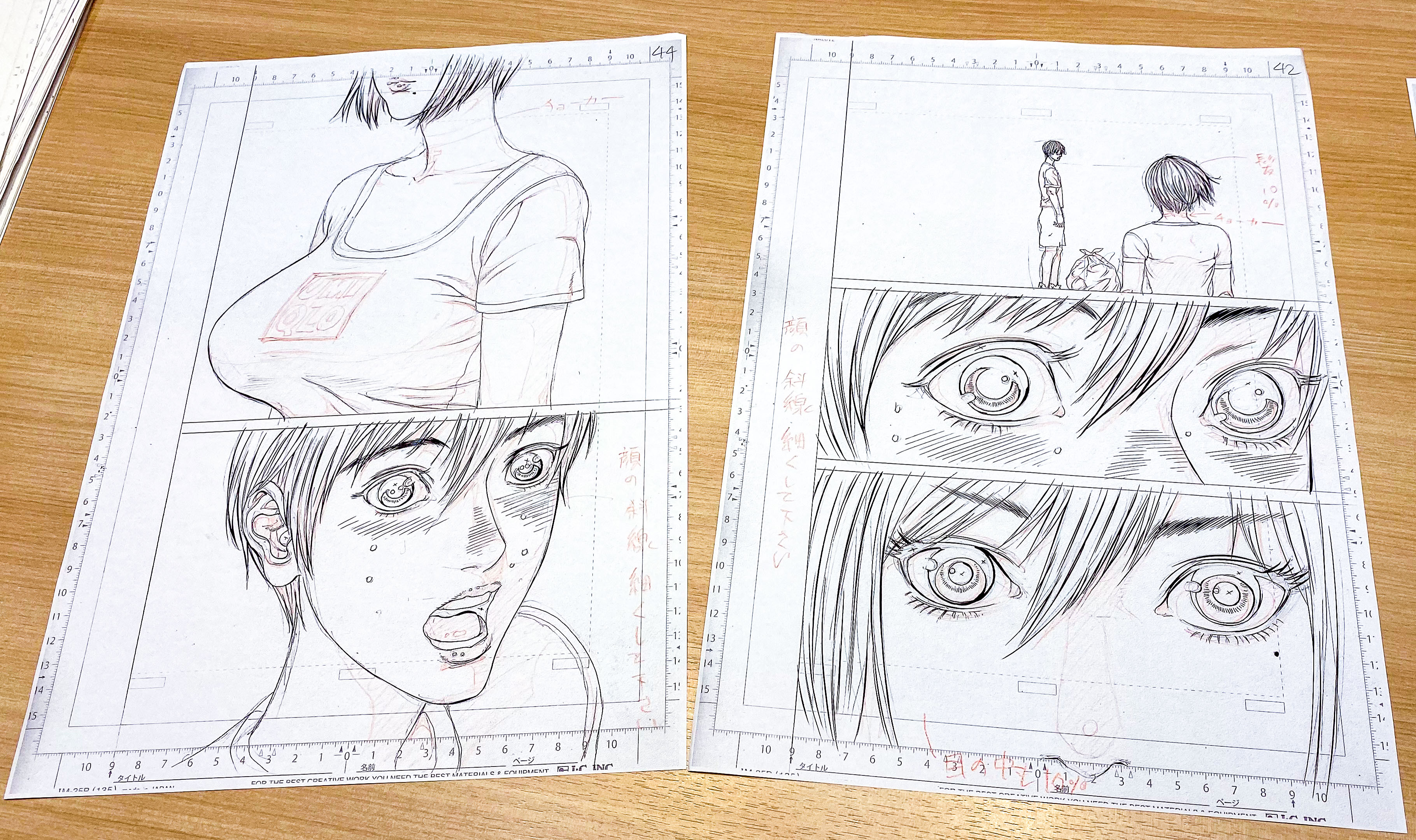
Photo credit: Daryl Harding
Stay tuned for part two of our interview with Hiroya Oku where we discuss GANTZ, Oku's thoughts on the Hollywood live-action remake, the manga industry as a whole, and how Oku-sensei feels about the international response to his manga series.
GIGANT is available in English from Seven Seas Entertainment with 5 volumes currently released physically and digitally.
Daryl Harding is a Japan Correspondent for Crunchyroll News. He also runs a YouTube channel about Japan stuff called TheDoctorDazza, tweets at @DoctorDazza, and posts photos of his travels on Instagram.
Kaho Shibuya is a Japanese talent who can be found showing off her cosplay shoots on Twitter and Instagram and playing video games on Twitch.
Do you love writing? Do you love anime? If you have an idea for a features story, pitch it to Crunchyroll Features.
If you liked the article, do not forget to share it with your friends. Follow us on Google News too, click on the star and choose us from your favorites.
For forums sites go to Forum.BuradaBiliyorum.Com
If you want to read more anime-manga articles, you can visit our anime-manga category.
